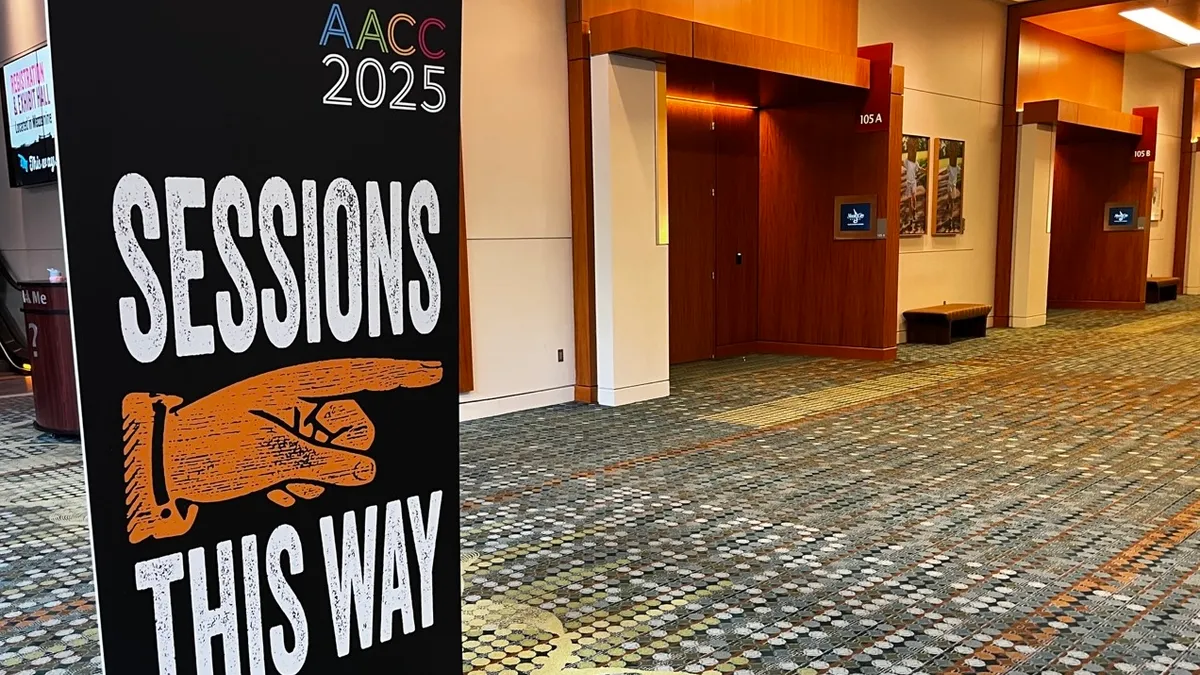Automation, artificial intelligence and other emerging technologies are changing the nature of work, and colleges and universities are pushing to keep up with the resulting demand for more and different kinds of education and training. But they're not working alone. Employers, which have scaled back their investments in employee education in recent years, are again seeing a need to be involved in that upskilling.
Yet studies repeatedly show that business leaders are often at odds with colleges and students as to whether graduates are adequately prepared for the workforce.
How higher ed and companies can reconcile their views in order to identify and address the skills students need was the topic of a panel session at a conference for public-private partnerships in postsecondary education, held this week at George Mason University, near Washington, D.C.
"Employers literally want to see that (graduates) have the skills they're looking for so (they) can be productive in that job on day one," said Ryan Craig, managing director of investment firm University Ventures and a panel participant. "That's hard and that requires a set of new and different initiatives (from universities and third parties)."
'Continuous skills'
Those skills are changing. Colleges are now charged with developing learners "who understand that education is no longer a one-time affair," said Nicole Smith, also a panelist and chief economist at the Georgetown University Center on Education and the Workforce. She added that postsecondary institutions have the potential to be a "revolving door" through which students come and go as they need to re-up their qualifications.
Sylvia Burwell, president of American University, agrees. "People are going to flow in and out of postsecondary education" seeking a mix of skills, knowledge and credentials, she said on the panel. "Continuous skills," which include critical thinking, problem-solving, teamwork, writing, oral communication and data analytics, serve as the foundation.
From there, she asks, "How do you think about the (additions) you are going to have throughout an individual's career and life?"
There's another dimension to consider, which panelist Shoshana Vernick, managing director of the Education Opportunity Fund at investment firm Sterling Partners, calls "curiosity skills," or a student's ability to adapt to and navigate "social challenges" such as a multigenerational workplace or the demands of a gig economy.
That full range of skills is important to employers, who may also require field-specific knowledge. For instance, in a pair of surveys last year, business leaders and hiring managers found new graduates lacked certain skills thought to help propel them beyond entry-level jobs, including oral communication and the ability to apply knowledge in real-world settings.
Expanding options ...
Integrating the skills employers desire into postsecondary curriculum is a balance, not a trade-off.
"It's about market differentiation," Burwell said. "Certain people need different things at different times."
Craig agrees. "The idea of a trade-off is a simplification," he said. "This is about staging and the fundamental question is: Who needs what, when, and does it have to be everything in one sitting?"
One sign colleges are moving in that direction is the spate of acquisitions in the online program manager market, where companies that help some colleges with distance education are expanding their portfolios to include boot camps, short courses and more certificates in addition to graduate degrees and executive education.
The emergence of these and other alternative education pathways make up the framework of the so-called "lifelong learning" approach, through which people return to postsecondary institutions to build out their educational profile piecemeal.
"If that comes to fruition, there are many universities … that will be enrollment challenged in their core product today that generates the lion's share of their tuition revenue," Craig said.
… And getting help from employers
With unemployment rates low and technological advances changing the skills employers seek, more companies are returning to the table to discuss their role in workforce education, Burwell said.
One example comes from an organization called the Greater Washington Partnership and its Capital CoLAB, a new collaboration between higher ed and businesses in the Washington, D.C., metro area. It includes major employers such as Amazon Web Services, defense contractor Northrop Grumman and Under Armour, as well as institutions such as American, George Mason, Georgetown, Howard University, Johns Hopkins University and Virginia Tech, among others.
So far the partnership centers on a pair of undergraduate credentials that look to qualify the skills these companies seek in entry-level employees.
One is for competency in specialized digital technology while the other, Burwell said, is a more generalized offering in cyber technology and data analytics. Students who earn the credentials will get priority for internships and job interviews among companies in the partnership. Burwell said the group is working on getting it listed on students' transcripts. And though acceptance is largely limited to employers in the region, she hopes it will eventually go national.
The collaboration gets at a key challenge higher ed leaders face: figuring out what employers want from graduates at a high level and then finding ways to offer more specific training. "For us it would be hard to work with every single business in the Washington, D.C., area," Burwell said. "Having them come together and agree has helped us as universities meet those needs and come together."
Craig predicts other third-party groups such as staffing and business services companies will also serve as intermediaries for insights into companies' training needs. He gives the example of Talent Path, which bills itself as a "last-mile" education provider for graduates pursuing entry-level jobs in technology fields. The company hires them as "full-time, salaried" consultants for firms, which after two years can hire them out of Talent Path, according to its website.
"They know within weeks whether the curriculum and the training have matched the employer needs," said Craig, who led a new investment in Talent Path's parent company Genuent. "Contrast that with a typical higher ed institution — it's not measured in weeks, it's measured in years, probably, if that."
Higher ed changes
As employers shift their stance, so does higher ed. A renewed focus on capturing program-level data could trigger consolidation among offerings or changes in how they are priced, panelists said.
"How do we position curriculum development, what is important for us as we develop opportunities for youth, and how do we decide on our partnerships?” Smith said.
According to Burwell, colleges should focus on their mission to provide scholarship and education. She added that institutions can own their piece of the partnership by emphasizing communication skills, creating inclusive environments, supporting faculty engagement with students and offering experiential learning on their own campuses.
That foundation will be relevant even if the push for strategic partnerships causes colleges to expand and disaggregate their offerings. "There's real inertia in the core right now because colleges and universities are logically trying to protect the bundle," Craig said. "Until the bundle ... begins to be unbundled, we're not going to see as much innovation as we might."






















